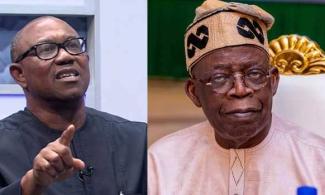
According to Tinubu, the document is filled with graphics and demagogic rhetorics with no substance.
The presidential candidate of the ruling All Progressives Congress (APC), Bola Tinubu, has described the manifesto of his Labour Party counterpart, Peter Obi, as an empty and vacuous document.
According to Tinubu, the document is filled with graphics and demagogic rhetorics with no substance.
Tinubu said this in a statement by the Director of Media & Publicity of the APC Presidential Campaign Council, Bayo Onanuga.
Tinubu’s comment was in reaction to the Labour Party and Obi's manifesto for the 2023 general elections, titled, ‘It is Possible: Our Pact with Nigerians.’
“After perusing the document which is very high on graphics and demagogic rhetorics and short on substance, we have come to the conclusion that the document is empty and vacuous,” the statement said in part.
The statement further read, “Mr. Peter Obi’s document contains no grand policy initiatives and options to excite right-thinking Nigerians. It was silent about how Obi wants to achieve his high falutin objectives.
“Instead, it will set alarm bells ringing in the South South and North East as Obi promises to ‘engineer the transition of Nigeria from a fossil fuel dependency to climate and eco-friendly energy use’. As expected, Obi’s document contains fallacies and false statistics.
“Obi claimed China moved 740 million people out of poverty. He understated the achievement and was silent about the period it took the Chinese Communist party to achieve this.
“China moved close to 800 million people out of poverty and it was achieved in 40 years. This makes the present APC government’s plan to move 100 million of Nigerians out of poverty in 10 years, more realistic than Obi’s rhetoric tends to suggest.”
He accused the Labour Party and Obi of campaigning to tackle insurgency by collaborating with neighbouring countries, describing it as the same strategy President Muhammadu Buhari employed “within his first week in office as President in 2015 and has continued to strengthen regional cooperation”.